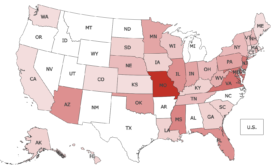 State legislatures have grown increasingly comfortable with the concept of transitioning public notice from printed newspapers to their digital versions. Nine states considered legislation in 2023 allowing some or all notices published in newspapers to be posted instead on newspaper websites. Eight states — including four new ones — have considered similar or identical bills in 2024.
State legislatures have grown increasingly comfortable with the concept of transitioning public notice from printed newspapers to their digital versions. Nine states considered legislation in 2023 allowing some or all notices published in newspapers to be posted instead on newspaper websites. Eight states — including four new ones — have considered similar or identical bills in 2024.
More evidence for the trend: Legislation allowing local news websites or “online-only newspapers” to serve as public notice alternatives to newspapers have been introduced in six states this year. Several other states have considered or passed bills authorizing newspapers’ e-editions to do the same.
Court invalidates election over public notice issue
 In a unanimous decision this summer, the Oklahoma Supreme Court invalidated the results of a November 2022 lodging-tax election in McCurtain County for failure to follow statutory publication requirements.
In a unanimous decision this summer, the Oklahoma Supreme Court invalidated the results of a November 2022 lodging-tax election in McCurtain County for failure to follow statutory publication requirements.
Statute Title 19 O.S. 2021 §383 requires questions to the people “to be published at least four (4) weeks in some newspaper published in the county” if there is such a newspaper.
(This story was originally published in the July 2024 issue of The Oklahoma Publisher, the monthly newsletter of the Oklahoma Press Association. It is reprinted here courtesy of OPA.)
California governor vetoes public notice bill
 California Governor Gavin Newsom this weekend vetoed a public notice bill that was supported by the California Newspaper Publishers Association (CNPA) and passed both houses of the legislature by wide margins. Like legislation that has already been approved in 20 other states, Assembly Bill 2095 would have required official newspapers to ensure that notices published in their print editions would also be posted free of charge on their own website and on their press associations’ statewide public notice site.
California Governor Gavin Newsom this weekend vetoed a public notice bill that was supported by the California Newspaper Publishers Association (CNPA) and passed both houses of the legislature by wide margins. Like legislation that has already been approved in 20 other states, Assembly Bill 2095 would have required official newspapers to ensure that notices published in their print editions would also be posted free of charge on their own website and on their press associations’ statewide public notice site.
In a statement issued Saturday, Newsom said he vetoed AB-2095 because he was concerned it “may require the state’s small community newspapers to hire additional personnel to upload notices and/or to pay for software tools to manage these uploads
Some local governments in Oregon may be misinterpreting new law
 Some local government units in Oregon are publishing notices on local news websites in lieu of official newspapers, according to announcements on those sites and official statements made by some of the governments.
Some local government units in Oregon are publishing notices on local news websites in lieu of official newspapers, according to announcements on those sites and official statements made by some of the governments.
The Philomath News, Salem Reporter and YachatsNews have reported that local governments in the counties in which they publish are running notices on their sites. Most, if not all, of those notices are being published exclusively on those websites and are not also being published in a local newspaper.
Press association touts “agreeable solution” on notices
 West Virginia state Senator Jack David Woodrum (photo on left) told attendees at the West Virginia Press Association (WVPA) convention last month that he may introduce a bill that would reduce fees for papers in the state that fail to publish notices on their own website and on WVPA’s statewide public notice site, according to a report on WVPA’s member website. The legislation wouldn’t change current laws requiring most notices in the state to be published in local newspapers.
West Virginia state Senator Jack David Woodrum (photo on left) told attendees at the West Virginia Press Association (WVPA) convention last month that he may introduce a bill that would reduce fees for papers in the state that fail to publish notices on their own website and on WVPA’s statewide public notice site, according to a report on WVPA’s member website. The legislation wouldn’t change current laws requiring most notices in the state to be published in local newspapers.
Celebrity announcements show power of newspaper notice
 Most news junkies will remember the summer of 2024 for the dramatic events that unfolded in the run-up to this year’s presidential election. For public notice geeks, however, it will be remembered as the Summer of Celebrity Notices.
Most news junkies will remember the summer of 2024 for the dramatic events that unfolded in the run-up to this year’s presidential election. For public notice geeks, however, it will be remembered as the Summer of Celebrity Notices.
Over the last three months, the normally mundane world of public notice intersected with celebrity culture in three big stories that generated a tremendous amount of coverage. The individuals who placed or were party to the ads would have preferred to keep their business secret, but that’s not how newspaper notice rolls.
Wichita moves notices to city website but adds new “print source”
 Wichita became the latest and most significant municipality in Kansas to approve a charter ordinance anointing the city’s website as its “official newspaper.” But the new ordinance came with a twist: It included a provision calling for the city to also publish its notices in a “secondary print source.”
Wichita became the latest and most significant municipality in Kansas to approve a charter ordinance anointing the city’s website as its “official newspaper.” But the new ordinance came with a twist: It included a provision calling for the city to also publish its notices in a “secondary print source.”
Wichita is at least the fifth municipality in Kansas to replace its official newspaper with the city website despite a state law requiring notices to be published in a local paper. Attorney General Kris Kobach gave them the green light when he issued a legal opinion last year declaring that home-rule provisions in the state’s constitution “allows cities to exempt themselves from nonuniform acts of the Legislature.” (As the last sentence in the opinion notes, website notice isn’t sufficient when a particular type of notice is specifically mandated by statute, e.g., budget notices, treasurer’s reports, etc.)
Town’s choice of official newspaper upheld in Connecticut
 The Connecticut Supreme Court held last month that a newspaper used for decades by the tiny borough of Fenwick to issue its public notices qualified as an official newspaper even though the paper had no subscribers there.
The Connecticut Supreme Court held last month that a newspaper used for decades by the tiny borough of Fenwick to issue its public notices qualified as an official newspaper even though the paper had no subscribers there.
The ruling overturned an appellate court decision invalidating a zoning regulation for lack of sufficient notice because the paper failed to satisfy a state law requiring official newspapers to have “substantial circulation in the municipality.”
Maryland governor vetoes public notice bill, calls independent media ‘vital public interest’
 As the Maryland-Delaware-DC Press Association (MDDC) had urged him to, Maryland Gov. Wes Moore last month vetoed House Bill 1258, which would have required Registers of Wills in each county to publish estate notices on a government website instead of local newspapers. The bill passed unanimously in both houses of the state legislature before it was vetoed.
As the Maryland-Delaware-DC Press Association (MDDC) had urged him to, Maryland Gov. Wes Moore last month vetoed House Bill 1258, which would have required Registers of Wills in each county to publish estate notices on a government website instead of local newspapers. The bill passed unanimously in both houses of the state legislature before it was vetoed.
In his extraordinarily frank veto letter, the governor acknowledged that existing notice requirements “present a financial burden on local and state governments as well as individual citizens.” But he argued that rapidly eliminating a significant source of advertising revenue like probate notices would endanger local newspapers, the survival of which he called “a vital public interest.”
Press groups in Minn., Louisiana turn the tide
 April saw an uptick in legislative activity surrounding public notice issues as many states approached the date they’re scheduled to adjourn. Press groups in Minnesota and Louisiana found themselves in scramble mode as public notice bills they opposed began moving. Although neither situation has been completely resolved, they appear to be headed in the right direction for residents of each state who care about government transparency.
April saw an uptick in legislative activity surrounding public notice issues as many states approached the date they’re scheduled to adjourn. Press groups in Minnesota and Louisiana found themselves in scramble mode as public notice bills they opposed began moving. Although neither situation has been completely resolved, they appear to be headed in the right direction for residents of each state who care about government transparency.
- Minnesota
Indiana adopts digital-newspaper notice
 Indiana Gov. Eric Holcomb signed three bills last month that will impact the state’s public notice laws. When it takes effect on July 1, the most significant bill will make Indiana the first state to authorize government units to publish primary notice on some newspaper websites or e-editions.
Indiana Gov. Eric Holcomb signed three bills last month that will impact the state’s public notice laws. When it takes effect on July 1, the most significant bill will make Indiana the first state to authorize government units to publish primary notice on some newspaper websites or e-editions.
House Bill 1204, which passed both the House and Senate unanimously, allows local governments and state agencies to circumvent the print editions of most newspapers by posting notices in one of their digital products as an alternative. However, the bill only applies to newspapers that distribute fewer than four editions per week; print will remain the exclusive means for government notice in papers that are published more frequently.
